If you’re aiming to become a middle school or high school teacher, getting an online secondary education degree is one of the most direct career pathways.

Most accredited programs are based on the requirements for becoming a licensed teacher in their respective state.
Editorial Listing ShortCode:
Given the growing demand for educators across all levels, teaching can be a fulfilling career that offers plenty of benefits. There are many traditional and online secondary education programs that can help you achieve your goal.
Online Secondary Education Degrees
Aside from being proficient in teaching, secondary educators also need to have specialized knowledge about the topics that they’ll be discussing with students.
The following subjects are the most common concentrations for online secondary education degrees:
Regardless of the specialty you select, you will still receive a strong foundation in secondary education and related courses.
Mathematics

If you love math and want to share your passion with the younger generation, then a secondary education degree in mathematics might be the right specialization for you. This degree can help prepare you to teach grade 6 to grade 12 students.
Accredited programs can help you fulfill many of the state licensure requirements for becoming a professional math teacher. The coursework features a mix of mathematics and education classes. On the mathematics end, you’ll be taking classes on topics like calculus, probability, discrete mathematics, and linear algebra. Most programs allow you to choose math electives so you can customize your coursework based on your interests.
Editorial Listing ShortCode:
At the same time, you’ll study the fundamentals of teaching, from designing a curriculum to encouraging critical thinking in students. Beyond teaching math in a school setting, some graduates go into curriculum design, numeracy coaching, and private tutoring.
Science

Science is a major component of every middle school and high school curriculum. Choosing a science specialization for your secondary education degree can help you develop both technical knowledge and effective teaching skills.
Since science is a broad field, most programs require you to focus on two scientific fields. Some popular fields include chemistry, psychology, computer science, physics, and general science. There are some programs that offer a wider range of choices, including microbiology, ocean science, and zoology. Either way, you can often mix and match courses to achieve the specializations you want.
Editorial Listing ShortCode:
You’ll also explore how to teach what you’ve learned to secondary students across different year groups, and you can get firsthand experience through a student teaching practicum. This often entails spending at least a few months working directly in a classroom. Graduates tend to become science teachers or science content administrators.
Social Studies

With a secondary education degree in social studies, you can learn how to teach subjects such as economics, history, politics and government, and geography. As a social studies teacher, one of your goals is to encourage critical thinking and discourse. You can help make your students more aware of the world at large and encourage them to think for themselves.
In a social studies secondary education program, you’ll take extensive coursework in teaching, from educational frameworks to classroom management. An accredited program will generally include a field experience as well, where you’ll be supervised by a licensed teacher.
Editorial Listing ShortCode:
When it comes to content knowledge, most programs take an all-around approach, so you’ll likely study all of the major areas of social studies. Overall, you can learn how to evaluate and improve your students’ understanding of social studies through research-backed methods of teaching.
Graduates mostly work in secondary education, but they might also find a place in nonprofit organizations, government, and human resources.
English

Are you fascinated by literature, writing, philosophy, and storytelling? If so, then studying secondary education with a concentration in English might be the track for you. This degree can help prepare you for teaching English or literature to middle school and high school students.
As an English teacher, you can delve into different kinds of texts, explore major ideas in culture and history, and help students hone their writing skills. To develop your own skills in this niche, you’ll usually take classes on classic texts, English composition, poetry, creative writing, English grammar, and literary theory.
Editorial Listing ShortCode:
Another component of the program involves translating your knowledge to the classroom, so you’ll train in several teaching strategies along with classroom management. For your final project, you’ll often have to student teach in an actual secondary school.
With this degree, most graduates take on educational roles as teachers or tutors. Others might go on to work in writing, communication, and public relations.
Secondary Education Careers & Salaries
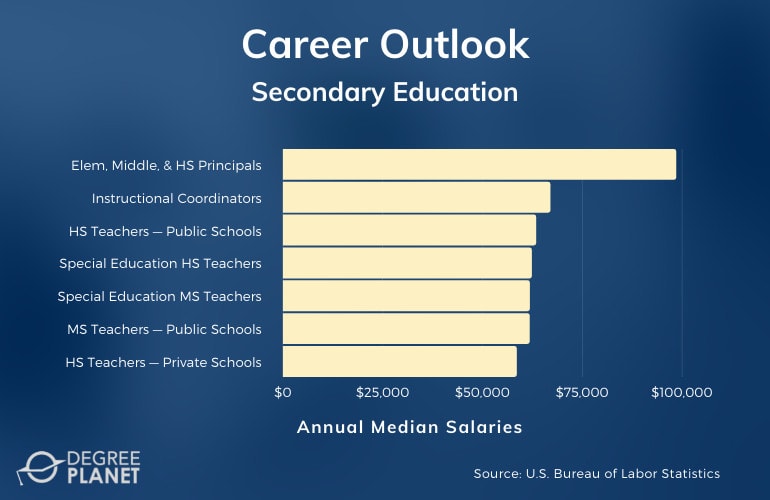
There are many careers available in the field of education, but the most traditional career path for secondary education graduates is to become high school or middle school teachers.
Middle school teachers often handle grade 6 to grade 8 students, while high school teachers are in charge of grade 9 to 12 students. Secondary teachers are expected to specialize in a certain field, such as English, history, science, or math. Some graduates go on to pursue masters degrees in a related specialization, such as an on-campus or online masters in English education, science education, curriculum development or education administration.
According to the Bureau of Labor Statistics, here are some careers, along with their median salaries, that are related to secondary education.
| Careers | Annual Median Salaries |
| Elementary, Middle, and High School Principals | $98,420 |
| Instructional Coordinators | $63,740 |
| Elementary and Secondary School Teachers — Local | $62,420 |
| Special Education Teachers — Secondary School | $62,120 |
| Special Education Teachers — Middle School | $61,820 |
| Middle School Teachers | $61,320 |
| High School Teachers — Private Schools | $58,550 |
| Adult Basic and Secondary Education and ESL Teachers | $59,720 |
| Career and Technical Education Teachers — Middle School | $61,820 |
| Teacher Assistants | $29,360 |
Individual salaries can vary greatly, depending on factors like location, years of experience, and expertise. Secondary school principals tend to have the highest median salaries, but that leadership position requires several years of experience. Teaching is the most standard career path for secondary education graduates, and there is currently steady demand for middle school teachers as well as high school teachers.
There are also secondary education graduates who teach in other settings outside of public and private schools. They may work with students who are trying to learn English as a second language, assist with college preparation, or teach teenagers who have learning disabilities.
Bachelor of Secondary Education Curriculum & Courses

A secondary teaching degree often includes these core courses:
- Digital Technology in the Classroom: There is a massive shift in education toward using digital learning tools, so this class helps you get comfortable with apps, software, and hardware for teaching.
- Child and Adolescent Development: This foundational course explores how children and young people develop physically, socially, intellectually, and psychologically.
- Education for Diverse Learners: You’ll learn how to teach students with a wide range of backgrounds, cultures, values, and strengths and how to lead inclusive classes.
- Literacy and Numeracy: This course focuses on evaluating and teaching core skills, such as speaking, reading, and writing, as well as mathematical thinking.
- Foundation of Education: You’ll examine the history and evolution of education, with an emphasis on the educational system in the US today.
- Teaching the Adolescent Learner: This course focuses on the trends, current issues, and frameworks of secondary education. You’ll gain exposure to teaching strategies that are geared toward secondary students.
- Introduction to Curriculum and Assessment: A vital part of what secondary teachers do is design or work with curriculums. On a more detailed level, this involves formulating learning goals and creating lesson plans.
- Educational Psychology: In this course, you’ll study theories and frameworks about how people learn and what motivates them. You’ll then analyze concrete ways to apply these in the classroom.
- The Art and Science of Teaching: This course gives a thorough overview of what it means to be a teacher, including responsibilities, law and ethics, and societal roles.
- Secondary Education Practicum: You’ll likely have multiple practicums where you’ll immerse in a secondary school, do active observation, and assist with teaching classes.
Aside from these education courses, you’ll also devote time to studying the specific field that you’ll teach.
How to Choose an Online Secondary Education Program

There are several factors to consider when choosing a secondary education program:
- Eligibility for licensure. Working as a professional teacher often requires getting your teaching license, with licensure criteria varying per state. You can check to see if the program you’re considering covers all of the credits that you need.
- Class schedule and format. Some programs are completely online, while others follow a hybrid format with in-person activities occasionally required. There are also programs that have a more flexible, self-paced format.
- Coursework. It’s beneficial for the program you enroll in to offer coursework in the specialization that you want. Specializations such as math and social studies are common, but more niche specializations, such as earth science and art, may be harder to find.
- Tuition. Tuition can be a primary consideration since even online programs can have a broad range of tuition fees.
- Practicum experience. Compared to other degrees, secondary education programs have a heavier practicum component. It’s strategic to ensure that your program has plenty of support for practicums and getting classroom experience.
- Accreditation. When it comes to online degrees, whether it’s an online bachelor’s or an online master’s in secondary education, regional accreditation is a mark of credibility.
- Graduate outcomes. Graduate outcomes are often telling of how strong a secondary education program is. What percentage of students graduate? Where do graduates work, and how many of them are employed right after graduation?
Considering all of these factors may help you be more confident in committing to a secondary education program.
Admissions Requirements

To apply for a secondary education program, you’ll likely have to provide the following:
- High school transcripts. Schools need to confirm that you’ve graduated from high school. Alternatively, you can submit a General Education Diploma (GED).
- Personal essay. You might have to write about why you’re interested in the program and what your related achievements and experiences are.
- Recommendation letters. Schools may ask for letters from references, such as teachers, academic advisors, and people you’ve worked with.
Some programs take SAT or ACT test scores into account, but not all schools require them.
Accreditation
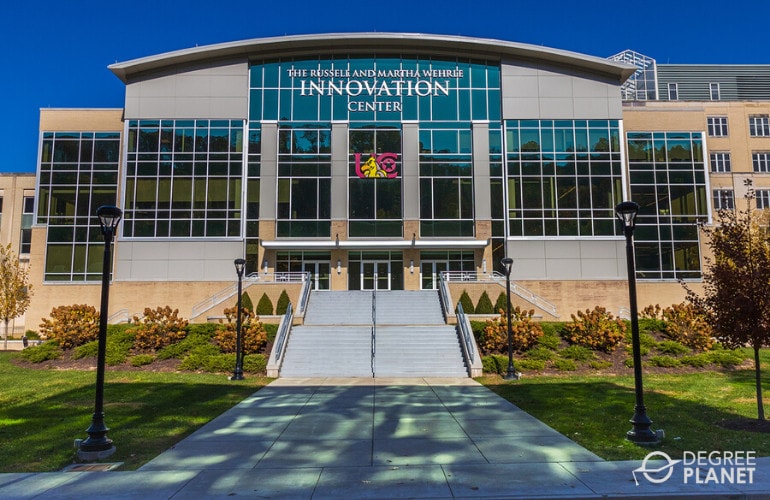
It’s advantageous to earn your secondary teacher degree from a regionally accredited college or university. Accredited schools are evaluated by official accrediting organizations. If a school has regional accreditation, it means that the school meets certain educational standards and has reliable, high-quality programs.
Editorial Listing ShortCode:
You can see a list of accrediting organizations in the directory of the Council for Higher Education Accreditation (CHEA). Regional accreditation is the most rigorous type of accreditation. Attending a regionally accredited school can be an eligibility factor for government financial aid as well as teaching licensure. Many recruiters also trust accredited schools more.
Secondary Education Licensure and Certifications

To become a professional teacher, it’s often required to earn a state teaching license. Licensing requirements can vary by state. So, if you’re licensed in a certain state, there’s no guarantee that you can practice in another state.
The basic requirements for licensure include an accredited bachelor’s degree with specific classes, teaching fieldwork, and passing scores in state examinations. Earning a degree in secondary education can help you fulfill most of these.
When earning a secondary education teaching license, you’ll also demonstrate that you’re proficient in your specialization. You can generally prove your proficiency by passing certain exams or by presenting college transcripts that include specific classes.
Financial Aid and Scholarships
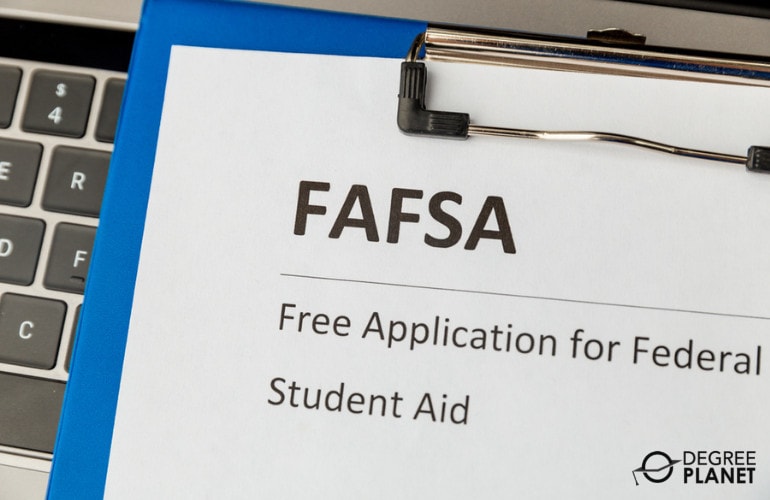
Regardless of which secondary education program you choose, you might be able to benefit from financial aid. Loans are the most accessible form of financial aid, but they have to be repaid with interest. On the other hand, grants and scholarships don’t have to be repaid.
The catch is that they may have certain criteria based on financial status, achievements, location, and more. As a prospective secondary education major, you can also look into scholarship opportunities. Common scholarships for this field include the Teach Grant, the For a Bright Future Global Scholarship, the PDK Educational Foundation Scholarship, and the National Merit Scholarship.
With so many types of financial aid out there, one of the first steps is to fill out the Free Application for Federal Student Aid (FAFSA). This can help determine your eligibility for government aid and other forms of need-based aid.
What Is a Secondary Education Degree?

A secondary education degree is a bachelor’s degree that trains students to become middle school and high school teachers.
Since teachers need to have a professional license, most secondary education degrees feature coursework that aligns with the requirements for licensure. Secondary educators also need to have a subject specialization, so many of the classes in a secondary education degree program are based on your chosen content area.
As a secondary education major, you can experience plenty of fieldwork, from doing observations to teaching internships that last for at least a semester in actual schools.
Can I Get a Teaching Degree Online?

Yes, it is possible to get a teaching degree online. Online bachelor’s degree in education programs are becoming more common. As long as you enroll in an accredited, state-approved school, your online degree can be as rigorous and reputable as traditional degrees.
There are also many online degree programs in secondary education that are designed to help you get your teaching license. Even online education programs have in-person components, though, because you’re required to have experience with teaching students to qualify for state licensure. Online programs typically encourage you to complete your internship at a local school in your area.
What Can You Do with a Secondary Education Degree?
A secondary education degree can help prepare you for several potential career paths. The most straightforward option is to become a middle school or high school teacher.
Middle school and high school teachers tend to teach one subject to a particular grade of students. Teachers at smaller schools may also be responsible for more than one subject. Depending on the school, some middle school teachers may handle the same group of students across different subjects.
Editorial Listing ShortCode:
Many secondary education graduates pursue other roles in the sector, such as school counseling, administration, or curriculum development. Others may work in writing, marketing, and human resources as well.
How Long Does It Take to Get a Bachelors Degree in Secondary Education Online?
A bachelors degree in secondary education consists of around 120 credits. If you study full-time and follow a standard 16 week semester, you can typically finish it in 4 years. There are also some accelerated 5 year programs that include both a bachelors and a masters.
Online degrees follow the same number of credits as traditional degrees, but there can be more scheduling options. For example, some online programs have 8 week semesters. If you take classes all year round with a full-time schedule, you can often finish in less than 4 years.
What’s the Difference Between Higher Education vs. Secondary Education?
Here are some of the major differences between higher education and secondary education.
| Higher Education | Secondary Education |
|
|
Secondary education is often seen as a preparation for higher education.
Is Getting a Degree in Secondary Education Worth It?

Yes, getting a degree in secondary education is worth it for many students. A degree in secondary education is a straightforward path to help you qualify for your secondary teaching license. Occupations within the education sector are also expected to see steady job growth.
According to the Bureau of Labor Statistics, employment for education, training, and library occupations is expected to grow 10% over the next ten years. Secondary education teaching jobs tend to have a number of unique benefits, such as getting the summer months off every year.
Editorial Listing ShortCode:
It’s also a fairly flexible field because, with experience and specialized training, you can have the opportunity to branch out into related roles, such as administration and program coordination.
Best Universities Offering Online Bachelors in Secondary Education Degree Programs
Methodology: The following school list is in alphabetical order. To be included, a college or university must be regionally accredited and offer degree programs online or in a hybrid format.

Arizona Christian University offers a Bachelor of Science in Secondary Education with concentrations in English Language Arts, History, Math, and Science. All students graduate with an endorsement from the Association of Christian Schools International. ACU provides small class sizes and a foundation in God’s Word and His Truths.
Arizona Christian University is accredited by the Higher Learning Commission.

Arizona State University offers a BA in English (Secondary Education). The program is designed to prepare students for teaching certification at the middle school and high school levels in the state of Arizona. There is also an accelerated option that is designed to give students the opportunity to earn both a bachelor’s degree and a master’s degree in as little as 5 years.
Arizona State University is accredited by the Higher Learning Commission of the North Central Association of Colleges and Schools.

Bellevue University offers a BS in Education with an endorsement in Mathematics. Students in the program must complete over 125 hours of practical field experience in 7th to 12th grade classrooms. This program is in line with the principles of the Interstate Teacher Assessment and Support Consortium.
Bellevue University is accredited by the Higher Learning Commission.

Buena Vista University offers a Bachelor’s in Education with an emphasis in English Secondary Education. The program is available in on-campus and hybrid formats. It includes courses such as Educational Psychology, History of American Education, Instructional Technology and Innovative Teaching, and Reading Methods and Strategies.
Buena Vista University is accredited by the Higher Learning Commission.

Casper College offers an Associate of Arts in Social Studies—Secondary Education. It is designed to provide the first two years of a bachelor’s degree program that leads to social studies teaching certification at the secondary level. Some of the coursework is available online. Students may earn an Associate of Arts or transfer into a bachelor’s degree program after completing their courses.
Casper College is accredited by the Higher Learning Commission.
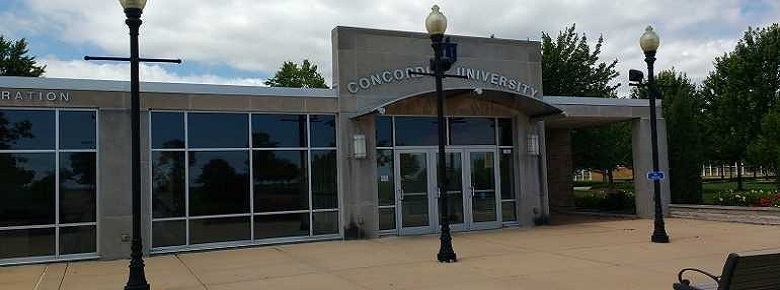
Concordia University—Wisconsin offers an online accelerated program for a Bachelor’s in Secondary Education—English and Language Arts. Students may begin in-classroom practicums their first year. The program can potentially be completed in as little as 3 years and aims to prepare graduates for licensure in the state of Wisconsin.
Concordia University – Wisconsin is accredited by the Higher Learning Commission.

Drury University offers a Bachelor of Science in Secondary Education. Students in the program can work towards middle and high school teaching certification in the state of Missouri in the subjects of Biology, English and Writing, or History. Courses include Technology in the Classroom, Diversity and Social Justice in Education, and Psychology of Human Growth and Development.
Drury University is accredited by the Higher Learning Commission.

Grand Canyon University offers a Bachelor of Science in Math Education. The courses aim to teach a Christian worldview and are available both online and on-campus. Online classes are 7 weeks long, and on-campus classes are 15 weeks long. Courses include Adolescent and Early Adolescent Psychology, Discrete Mathematics, and Calculus and Analytic Geometry I and II.
Grand Canyon University is accredited by the Higher Learning Commission.

Liberty University offers a B.Ed. in Social Studies Education that is 100% online. Practicums and student teaching may be completed at a local school. Courses are just 8 weeks long, and students usually take an average of 3.5 years to graduate. Coursework includes Foundations of Education, Introduction to Geography, and History of Western Civilization.
Liberty University is accredited by the Southern Association of Colleges and Schools Commission on Colleges.

Midway University offers an online program for a Bachelor’s in Education—Middle School Social Studies. The program is designed to prepare students for teaching certification in grades 5-9 in the state of Kentucky. Midway has a student-to-faculty ratio of just 15-to-1. Applicants must apply for acceptance to the teacher education program after being accepted to Midway.
Midway University is accredited by the Southern Association of Colleges and Schools Commission on Colleges.

Newman University offers a Bachelor of Science in Secondary Education with concentrations available in Biology, Chemistry, English, History and Government, Mathematics, and Physics. This program is designed to meet teaching certification requirements in the state of Kansas. Newman University ranks high on job placement rates and scores on licensure exams.
Newman University is accredited by the Higher Learning Commission.

Ottawa University offers an online Bachelor of Arts in Mathematics with a concentration in Secondary Education. Students in the program are required to study algebra, geometry, statistics, calculus, discrete mathematics, and computer programming and can get hands-on, in-classroom experiences. Courses are available in accelerated terms that are 8 weeks long.
Ottawa University is accredited by the Higher Learning Commission.

The Citadel offers a Bachelor of Science in Secondary Education (Social Studies) that can be pursued in-person or online. Evening classes are also available. The focus is on learner-centered education and educating diverse populations. Courses include Education in Modern Society, Educational Psychology, Cultural Anthropology, World Geography, and more.
The Citadel is accredited by the Southern Association of Colleges and Schools Commission on Colleges.
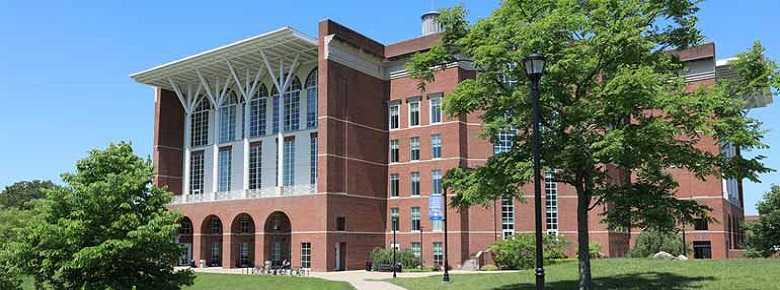
The University of Kentucky offers a BA in Secondary English Education. Courses are available in on-campus, online, and hybrid formats. This program is designed to be a good match for students who are intellectually curious, enthusiastic about using language arts in daily life, and committed to equitable instruction.
The University of Kentucky is accredited by the Southern Association of Colleges and Schools Commission on Colleges.

Western Governors University offers an online program for a Bachelor of Science in Mathematics Education. It is designed to prepare students for licensure in any US state. Most students finish within 42 months. The program includes demonstration teaching and pre-clinical experiences but can otherwise be completed entirely online with no set meeting times.
Western Governors University is accredited by the Northwest Commission on Colleges and Universities.
Getting Your Bachelor’s Degree in Secondary Education Online

A bachelor’s degree in secondary education might be the next step for you if you love teaching and mentoring the younger generation. This type of degree program often provides a straightforward track to teaching licensure.
Since teaching skills are widely valued in other industries, you can also have career options outside of education. Getting your secondary education degree online is now more doable than ever, with accredited schools offering various program options and specializations.
If you feel called to teach middle school or high school, you can answer the call today by exploring accredited secondary education programs.

